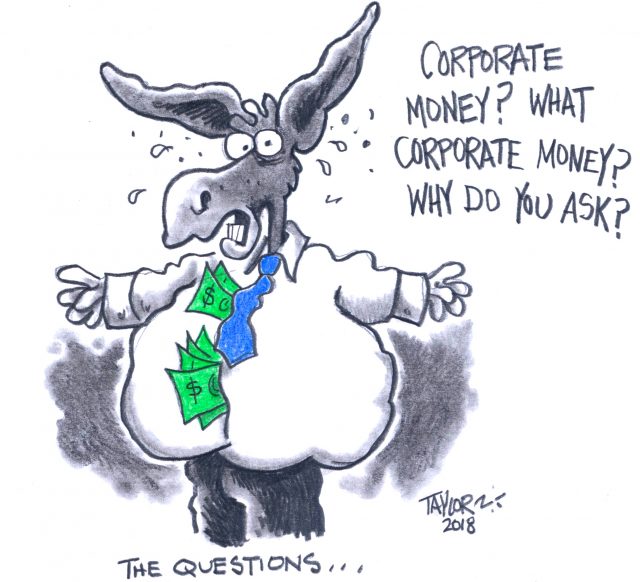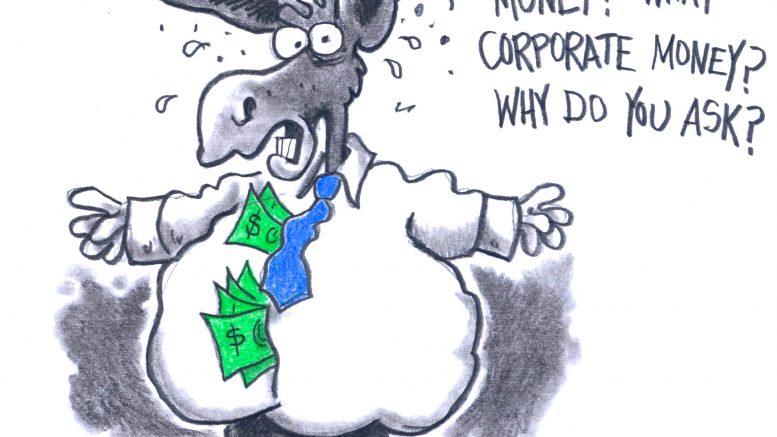
By Itai Vardi
The HuffPost (2/12/18)
When Democratic legislators gathered in a hotel in Portland, Maine, for a two-day policy conference last August, they were joined by a host of corporate interests who have good reason to want in on those conversations.
The meeting of the Democratic Legislative Campaign Committee, the party arm responsible for supporting state legislative candidates, was closed to the press and billed as an off-the-record event, but HuffPost has exclusively obtained a copy of the agenda, which shows the members of the DLCC’s finance council.
The finance council includes companies, trade groups, labor unions and public interest organizations, who pay anywhere from $12,000 to more than $100,000 to the DLCC. In return, the conference provided an opportunity for donors to interact with state legislators ― many of whom head their respective chambers ― from around the country.
One state legislator, who asked not to be named because he’s received assistance from the DLCC, said he “felt uncomfortable” about the abundance of corporate interests.
The Portland conference included prominent representation from the pharmaceutical and health insurance industries, including lobbyists from America’s Health Insurance Plans, a national trade group that is currently lobbying against Vermont Sen. Bernie Sanders’ Medicare For All bill. Representatives from the Association for Accessible Medicines, Eli Lilly, Sanofi, Sunovion Pharmaceuticals, Anthem, Merck, Novartis and Vertex also attended.
Promoting cigarettes … no bottom
There was also a panel titled “Nicotine Without Smoke: How to Reduce the Harm of Smoking,” featuring Dr. Saul Shiffman, a University of Pittsburgh professor and adviser to Pinney Associates, a pharmaceutical consulting firm that works with tobacco giant Reynolds American. The company, which also produces e-cigarettes and is currently lobbying Congress for “harm reduction” approaches to tobacco regulation, sent no fewer than four lobbyists to the conference, according to the agenda.
Representatives from the Edison Electric Institute, the powerful national trade group advancing utilities’ interests, were also present, as were the American Fuel & Petrochemical Manufacturers, the Nuclear Energy Institute, McDonald’s, Coca-Cola, Comcast, Monsanto, eBay and Wells Fargo.
Major labor unions also attended, including the International Union of Painters and Allied Trades, Iron Workers International and International Brotherhood of Teamsters, as well as a representative from Americans for Responsible Solutions, which advocates for gun control.
The finance council members who paid $35,000 or more to the DLCC were granted the opportunity for one-on-one meetings with state legislators slated for 90 minutes during the second day of the conference, according to the agenda.
DLCC communications director Mara Sloan said the policy conferences are forums for legislators to engage with each other and share new ideas, as well as “an opportunity for legislators to interact with industry leaders and learn more about policy positions of both the legislators and the organizations.”
Sloan said that finance council members take part in setting the agenda, as part of “a collaborative process, with those planning to attend weighing in on what they would like to see in upcoming policy sessions, breakout panels or skills building workshops.” …
(Commoner Call cartoon by Mark L. taylor, 2018. Open source and free to use with link to www.thecommonercall.org )
*****
Embracing Bold Platforms, Progressives Working To Roust Corporate Dems Nationwide
By Jake Johnson
Common Dreams (2/12/18)
Driven by the conviction that the Democratic Party must undergo a fundamental transformation if it is to vanquish both the immediate threats posed by President Donald Trump and deep-seated societal ills that were present long before Trump arrived on the scene, progressive insurgents throughout the country are working to unseat Democratic incumbents in the 2018 midterms and push the party left.
“What this is about is that if we reelect the same Democratic Party that we had going into this mess, then we’re going to have the same exact result,” Alexandria Ocasio-Cortez, a former organizer for Sen. Bernie Sanders’ 2016 presidential campaign who is taking on Rep. Joe Crowley (D-N.Y.), said in an interview with Politico. “In order for the country to move forward, the Democratic Party has to transform.”
“This is a remarkably aware, awakened, active new generation looking at politics as not an option anymore but an obligation. I looked around and I saw a Democratic Party not doing much at all to welcome that group to the fold,” — Congressional candidate Suraj Patel.
Ocasio-Cortez is just one of many progressives running against the status quo enforced by their state’s Democratic machine, which—as The Intercept detailed in a recent report—often works to constrict policy boundaries and tilt the balance of power toward the donor class.
Fueled by small-dollar contributions—which in some cases have been enough to outraise incumbents who rely on corporate cash—grassroots candidates across the nation are working to break through these boundaries by running on ambitious progressive platforms in 2018 that include Medicare for All, tuition-free college, criminal justice reform, and a $15 federal minimum wage.
By Politico‘s count, “six veteran incumbents already face energetic primary challenges from younger candidates in New York and Massachusetts. In Illinois, two Chicago-based members are being targeted from the left.”
Taking on a right-wing Dem
Marie Newman, who is taking on right-wing Democratic Rep. Dan Lipinski in Illinois’ 3rd Congressional District, highlighted shifting public opinion in progressives’ favor as one of the reasons insurgents are sparking such enthusiasm in blue states and throughout the U.S.
“About 75 percent are for healthcare for all or Medicare for All,” Newman said of the 3rd District, highlighting a number that coincides with the massive growth in support of Medicare for All nationwide. As Common Dreams reported last July, 62 percent of the American public now believes it is “the federal government’s responsibility to make sure that all Americans have healthcare coverage.”
Jan Rodolfo, Midwest director of National Nurses United (NNU), praised Newman in an interview with In These Times, noting that “it’s important to send a message to incumbents that if they fail to act as progressives, there’s consequences for them electorally.”
The wave of progressive primary challenges by candidates like Newman and Ocasio-Cortez come as Democratic voters are increasingly dissatisfied with the party’s leadership.
According to a Harvard-Harris poll conducted last October, 52 percent of Democrats think “movements within the Democratic Party to take it even further to the left and oppose the current Democratic leaders.”
Suraj Patel, who is challenging Rep. Carolyn Maloney (D-N.Y.), told Politico that the progressive wave now taking shape is largely a result the Democratic leadership’s failure to respond to the needs of the party’s constituents.
“This is a remarkably aware, awakened, active new generation looking at politics as not an option anymore but an obligation. I looked around and I saw a Democratic Party not doing much at all to welcome that group to the fold,” Patel said. “I refuse to wait my turn in an establishment that doesn’t make sure that people are competing. That’s one of the things the Democrats need to grapple with.”
(This work is licensed under a Creative Commons Attribution-Share Alike 3.0 License.)

